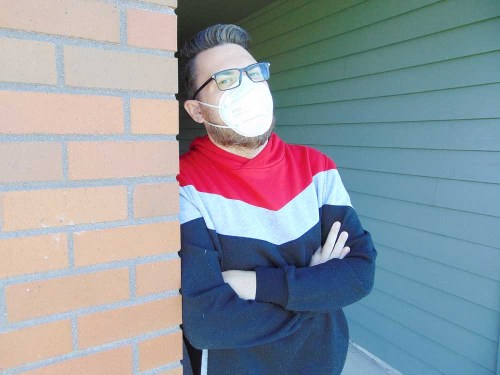Umatilla man experiences breakthrough case of COVID-19
Published 11:00 am Tuesday, September 21, 2021

- Andrew Morris, of Umatilla, takes a rare step out of doors Monday, Sept. 20, 2021. He has been sick for two weeks with a breakthrough case of COVID-19.
UMATILLA — Two weeks after contracting COVID-19, Umatilla resident Andrew Morris is sick and feeling more than a little frustrated. He said he did everything right, including getting vaccinated, and he still became ill.
Morris is one of the unlucky few breakthrough cases, people who were vaccinated but came down with COVID-19 anyway.
“This is worse than any flu I’ve had,” Morris said.
He had trouble recalling a comparable illness. After some thought, he compared it to Epstein-Barr virus infection, which also was painful.
With COVID-19, Morris’ body aches. He cannot taste his food, he cannot smell and his throat is sore. He spends most of his days and nights in bed, as even walking to the bathroom is difficult.
Bedridden, he continuously questions himself: “What did I do wrong?”
Joe Fiumara, Umatilla County Public Health director, said roughly 1 out of every 50 people hospitalized with COVID-19 since January in the county were vaccinated against COVID-19, or approximately 49 of 50 hospitalizations in the county this year were unvaccinated.
Morris received his first shot of the Moderna vaccine in March, when it was first available to him, then followed up with his second jab in April. Even after the final shot, he continued to wear masks most of the time, he washed his hands frequently and made regular use of hand wipes.
“Possibly, I let down my guard,” he said.
There were public events, movies and football games he attended. Still, he said he was careful.
He does not know where he got sick, but he does remember the first days of the illness. COVID-19 began gently for him. At first, he thought it was allergies.
But then, his symptoms strengthened. He decided to take an at-home COVID-19 test, just as a precaution. He was stunned when his test results were positive.
“I was blown away. I thought it was wrong at first,” he said.
Sure, he had a fever, runny nose and sore throat, but he could still smell and taste. The test must be wrong, he thought. How could he have the disease after taken many precautions to avoid it? He had never had it before.
The day after the test, his condition worsened. His senses of taste and smell began failing, and other symptoms grew worse.
He finally had to admit he had COVID-19, and he called his doctor. Morris explained his symptoms to his doctor, which convinced him he had the disease. The best thing he could do would be rest and monitor his own health, and visit the hospital if his condition became much worse.
So that is what he did. He stayed in bed, and he began taking over-the-counter medication and vitamins — NyQuil, zinc, vitamins C, D and B. He recently started taking dexamethasone and it has helped quite a bit, he said. Still, his illness continues.
Vaccinations remain key
Fiumara explained that breakthrough cases for any disease “occur for a variety of reasons.” Waning immunity is one cause for disease, which may be a contributing factor to COVID-19 breakthroughs. This may necessitate booster doses, as is done with tetanus, or a series of vaccinations, as is done for measles and rubella.
“Other reasons that immunity could wane include age and medical conditions or medications that suppress the effectiveness of the immune system,” Fiumara said.
While researchers continue to study the disease, Fiumara recommended vaccinations. Breakthrough illnesses, if they occur, are generally less severe than are regular cases.
“Breakthrough cases tend to have much less severe symptoms, or no symptoms at all,” he said. “While preventing all illness is always a goal, the main function of vaccinations is to prevent severe illness and death.”
The Oregon Health Authority report from Sept. 16 showed from Sept. 5 to 11 there were 14,046 cases of COVID-19 in the state. Unvaccinated cases accounted for 81.3% of that total.
In addition to getting a vaccine, Fiumara recommended wearing masks in crowds. People should be especially careful if they are older or immunocompromised. They should stay home if they have even minor symptoms, and people should wash hands often.
At some point, he said, we will be free from restrictions and masking, though this depends on how the virus adapts and if a more deadly variant shows up.
“Our chance at eradicating this was in the early days and we have missed that,” Fiumara said. “Most likely this will become like the flu, where it cycles in and out of susceptible populations and others are left mostly untouched.”
And the best hope, he said, to “achieve decreased impacts” from COVID-19 is to increase vaccinations.









